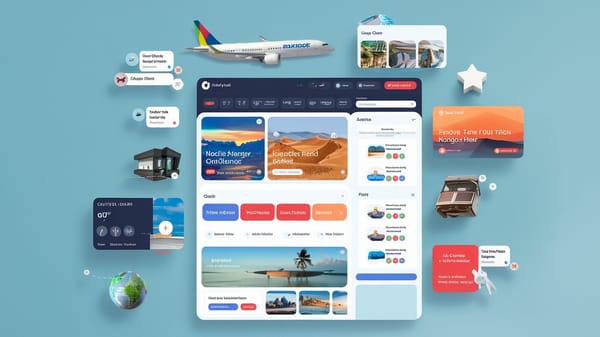Open Source ChatGPT Alternatives
Exploring Open Source ChatGPT Alternatives

Exploring Open Source ChatGPT Alternatives
In the rapidly evolving landscape of artificial intelligence, ChatGPT, developed by OpenAI, has emerged as a prominent tool for generating human-like text responses. However, its proprietary nature has led to a growing interest in open-source alternatives that offer similar capabilities while providing users with greater flexibility and control. This report delves into the realm of open-source ChatGPT alternatives, highlighting their significance, benefits, and the diverse options available to developers and businesses.
Open-source alternatives to ChatGPT are gaining traction for several reasons. Firstly, they empower users to modify and adapt the software to meet specific needs, fostering innovation and customization. Secondly, open-source solutions often come with fewer restrictions, allowing for broader experimentation and integration into various applications. Moreover, they contribute to a more competitive ecosystem, reducing dependency on a single service provider and potentially lowering costs.
Among the notable open-source alternatives is OpenChatKit, a comprehensive solution developed by Together, leveraging the RedPajama model. Another contender is ChatRWKV, which utilizes a Recurrent Neural Network (RNN) language model, offering a unique approach to AI-driven conversations. ColossalChat stands out with its RHLF pipeline, akin to OpenAI's GPT-4, providing a robust platform for code writing and intelligent responses.
The open-source community also offers tools like KoboldAI, designed for assisted writing, and GPT4ALL, which allows users to run chatbots locally on their devices. Additionally, Jan presents a privacy-focused alternative that operates entirely offline, emphasizing user control and data security.
You can also visit Oncely.com to find more Top Trending AI Tools. Oncely partners with software developers and companies to present exclusive deals on their products. One unique aspect of Oncely is its “Lifetime Access” feature, where customers can purchase a product once and gain ongoing access to it without any recurring fees. Oncely also provides a 60-day money-back guarantee on most purchases, allowing customers to try out the products and services risk-free.
Oncely are hunting for the most fantastic AI & Software lifetime deals like the ones below or their alternatives:

Understanding Open Source ChatGPT Alternatives
The Need for Open Source Alternatives
The rise of AI chatbots, particularly OpenAI's ChatGPT, has revolutionized how we interact with technology. However, the proprietary nature of ChatGPT has led to a growing interest in open-source alternatives. Open-source solutions offer transparency, flexibility, and community-driven improvements, which are crucial for developers and businesses seeking customizable and cost-effective AI tools. The open-source model allows users to modify and enhance the software to fit specific needs, fostering innovation and collaboration. This section explores some of the most notable open-source alternatives to ChatGPT, highlighting their unique features and potential applications.
Key Open Source ChatGPT Alternatives
OpenChatKit
OpenChatKit is a comprehensive open-source alternative developed by Together. It was created in collaboration with research organizations like LAION, known for their work on Stable Diffusion. OpenChatKit utilizes the RedPajama model, one of the largest open-source AI models available. This model is designed to provide a robust framework for building conversational AI applications. Users can explore its GitHub repository for technical details and to contribute to its development. OpenChatKit is particularly appealing to developers and businesses looking for a customizable and scalable AI solution.
ChatRWKV
ChatRWKV is another open-source alternative that leverages a Recurrent Neural Network (RNN) language model. This model is available for demonstration on platforms like Hugging Face, where users can test its capabilities and explore its potential applications. The GitHub page provides comprehensive information about its repository, technical specifications, and the latest version updates. ChatRWKV is designed to be a versatile tool for developers and businesses aiming to create custom chatbots tailored to specific use cases.
ColossalChat
ColossalChat is part of the Colossal AI initiative, which aims to facilitate the cloning of AI models to build ChatGPT-like platforms. This open-source project provides the necessary tools and frameworks for developers to create their own conversational AI systems. By offering a flexible and scalable solution, ColossalChat empowers users to develop AI applications that meet their unique requirements. The project's focus on open-source collaboration ensures continuous improvement and innovation in the field of AI chatbots.
Cerebras-GPT
Cerebras-GPT offers open-source GPT-like models trained with a massive number of parameters. While it does not provide a ready-to-use chatbot, it offers models that can be integrated into various applications for enhanced accuracy and computational efficiency. The models are available on Hugging Face, where users can access detailed information and explore their potential uses. Cerebras-GPT is ideal for developers seeking high-performance models for specialized AI tasks.
OpenAssistant
OpenAssistant was a project aimed at providing everyone with access to a ChatGPT-like chatbot. Although the demo is no longer functional, the project's progress and source code remain available for developers to build upon. OpenAssistant represents a community-driven effort to democratize access to advanced AI technologies, allowing users to create personalized and efficient conversational agents.
Advantages of Open Source ChatGPT Alternatives
Open-source ChatGPT alternatives offer several advantages over proprietary solutions. Firstly, they provide greater transparency, allowing users to understand the underlying algorithms and data used in the models. This transparency is crucial for building trust and ensuring ethical AI practices. Secondly, open-source models are highly customizable, enabling developers to tailor the software to specific needs and integrate it seamlessly into existing systems. This flexibility is particularly beneficial for businesses looking to optimize their workflows and enhance productivity.
Moreover, open-source alternatives often have active communities that contribute to their development and improvement. This collaborative approach fosters innovation and ensures that the software remains up-to-date with the latest advancements in AI technology. Additionally, open-source solutions are typically more cost-effective than proprietary options, as they eliminate licensing fees and allow for free distribution and modification.
Challenges and Considerations
While open-source ChatGPT alternatives offer numerous benefits, they also present certain challenges. One of the primary concerns is the need for technical expertise to implement and maintain these solutions. Unlike proprietary software, which often comes with dedicated support and user-friendly interfaces, open-source models may require significant technical knowledge to deploy and customize effectively.
Another consideration is the potential for security vulnerabilities. Open-source software is accessible to everyone, including malicious actors who may exploit weaknesses in the code. Therefore, it is essential for users to regularly update their systems and apply security patches to mitigate these risks.
Finally, the performance of open-source models may vary depending on the quality of the training data and the resources available for model development. Users must carefully evaluate the capabilities of each alternative to ensure it meets their specific requirements.
Conclusion
Key Open Source Alternatives and Features
OpenChatKit
OpenChatKit is a prominent open-source alternative to proprietary AI models like ChatGPT. Developed by Together, OpenChatKit is designed to provide a versatile and customizable framework for building conversational AI applications. It is built on top of the GPT architecture, offering a robust foundation for natural language processing tasks.
Features:
- Modular Architecture: OpenChatKit is designed with a modular architecture, allowing developers to customize and extend its capabilities. This flexibility is crucial for tailoring the model to specific use cases and integrating it with other systems.
- Community-Driven Development: The project is open to contributions from the community, fostering a collaborative environment for innovation and improvement. This approach ensures that the model evolves with the needs of its users.
- Pre-trained Models: OpenChatKit provides access to pre-trained models, which can be fine-tuned for specific applications. This feature reduces the time and resources required to deploy a functional conversational AI system.
- Extensive Documentation: Comprehensive documentation is available, guiding users through installation, customization, and deployment processes. This resource is invaluable for developers new to AI or those transitioning from proprietary systems.
ChatRWKV
ChatRWKV is another open-source alternative that leverages the RWKV architecture, which combines the strengths of recurrent neural networks (RNNs) and transformers. This hybrid approach aims to improve the efficiency and scalability of language models.
Features:
- Efficient Training: The RWKV architecture is designed to be more memory-efficient than traditional transformer models, making it suitable for environments with limited computational resources.
- Scalability: ChatRWKV can be scaled to handle large datasets and complex language tasks, making it a viable option for enterprise-level applications.
- Versatile Applications: The model is adaptable to various natural language processing tasks, including text generation, summarization, and translation.
- Open Source Community: As an open-source project, ChatRWKV benefits from community contributions, which help enhance its features and performance over time.
ColossalChat
ColossalChat is an open-source initiative that focuses on creating large-scale conversational AI models. It is part of the Colossal-AI project, which aims to democratize access to high-performance AI tools.
Features:
- Large-Scale Model Support: ColossalChat is designed to support the training and deployment of large-scale models, making it suitable for applications requiring high levels of accuracy and complexity.
- Distributed Training: The platform supports distributed training, allowing users to leverage multiple GPUs or nodes to accelerate the training process. This feature is essential for handling large datasets efficiently.
- Integration with Colossal-AI: ColossalChat integrates seamlessly with the broader Colossal-AI ecosystem, providing access to a suite of tools for optimizing AI model performance.
- Customizable Pipelines: Users can customize the training and inference pipelines to suit their specific needs, enhancing the flexibility and applicability of the model.
Cerebras-GPT
Cerebras-GPT is an open-source language model developed by Cerebras Systems. It is designed to be compute-efficient, making it accessible to a broader range of users and applications.
Features:
- Compute Efficiency: Cerebras-GPT is optimized for compute efficiency, reducing the hardware requirements for training and inference. This feature makes it accessible to organizations with limited computational resources.
- Scalable Architecture: The model can be scaled to accommodate various levels of complexity and data size, making it suitable for both small-scale and enterprise-level applications.
- Open Access: As an open-source project, Cerebras-GPT is freely available for use and modification, encouraging innovation and experimentation within the AI community.
- Comprehensive Support: Cerebras Systems provides extensive support and resources for users, including documentation and community forums, to facilitate the adoption and customization of the model.
OpenAssistant
OpenAssistant is an open-source project aimed at creating a versatile and user-friendly conversational AI system. It is part of the LAION initiative, which focuses on open and accessible AI research.
Features:
- User-Centric Design: OpenAssistant is designed with a focus on user experience, providing intuitive interfaces and easy-to-use tools for building conversational applications.
- Multilingual Support: The model supports multiple languages, making it suitable for global applications and diverse user bases.
- Extensible Framework: OpenAssistant offers an extensible framework that allows developers to add new features and capabilities as needed. This flexibility is crucial for adapting to changing requirements and emerging technologies.
- Active Community: The project benefits from an active community of developers and researchers who contribute to its ongoing development and improvement. This collaborative environment fosters innovation and ensures the model remains relevant and effective.
Benefits of Using Open Source AI Models
Customization and Flexibility
One of the primary benefits of using open-source AI models is the ability to customize and adapt the models to specific needs. Unlike proprietary models, open-source alternatives allow developers to modify the source code, enabling them to tailor the AI's functionality to suit particular applications or industries. This flexibility is crucial for businesses that require unique solutions that proprietary models may not offer. For instance, OpenChatKit allows users to explore its GitHub page for technical details and adapt the model to fit their use cases. This adaptability ensures that organizations can optimize AI performance for their specific requirements, enhancing efficiency and effectiveness.
Cost-Effectiveness
Open-source AI models are generally more cost-effective than their proprietary counterparts. Since these models are freely available, organizations can significantly reduce the costs associated with licensing fees. This financial advantage is particularly beneficial for startups and small businesses with limited budgets. By utilizing open-source models like GPT4All, which can be executed locally without the need for expensive GPU resources or constant internet connectivity, companies can deploy powerful AI solutions without incurring substantial expenses. This cost-effectiveness democratizes access to advanced AI technologies, allowing a broader range of users to benefit from AI advancements.
Transparency and Security
Open-source AI models offer greater transparency compared to proprietary models. The open nature of these models means that their code is publicly accessible, allowing developers and researchers to scrutinize and understand the underlying algorithms and data processing methods. This transparency is crucial for building trust, as users can verify the model's behavior and ensure it aligns with ethical standards and privacy regulations. For example, AnonChatGPT emphasizes user privacy by not logging or storing chats, providing a secure environment for AI conversations. This level of transparency is often lacking in proprietary models, where the inner workings are hidden from users.
Community Support and Collaboration
The open-source community is a vibrant ecosystem of developers, researchers, and enthusiasts who contribute to the continuous improvement of AI models. This collaborative environment fosters innovation and accelerates the development of new features and capabilities. Open-source projects benefit from the collective expertise of a global community, leading to rapid advancements and the sharing of best practices. For instance, the development of ChatRWKV involves contributions from various developers who enhance its functionality and performance. This community-driven approach ensures that open-source models remain at the forefront of AI technology, providing users with cutting-edge solutions.
Ethical and Responsible AI Development
Open-source AI models promote ethical and responsible AI development by allowing users to audit and modify the models to align with ethical guidelines and societal values. This capability is essential for addressing concerns related to bias, fairness, and accountability in AI systems. By having access to the source code, developers can implement measures to mitigate biases and ensure that the AI operates in a fair and unbiased manner. The open-source nature of models like Flan-T5 enables researchers to conduct thorough evaluations and make necessary adjustments to improve the model's ethical performance. This focus on ethical AI development is increasingly important as AI systems become more integrated into various aspects of society.
Innovation and Experimentation
Open-source AI models provide a platform for innovation and experimentation, allowing developers to explore new ideas and push the boundaries of AI technology. The availability of source code encourages experimentation, leading to the creation of novel applications and use cases. For example, ColossalChat supports the cloning of AI models, enabling developers to experiment with different configurations and architectures. This freedom to innovate is crucial for advancing AI research and discovering new possibilities that proprietary models may not support. By fostering a culture of experimentation, open-source models contribute to the rapid evolution of AI technologies.





